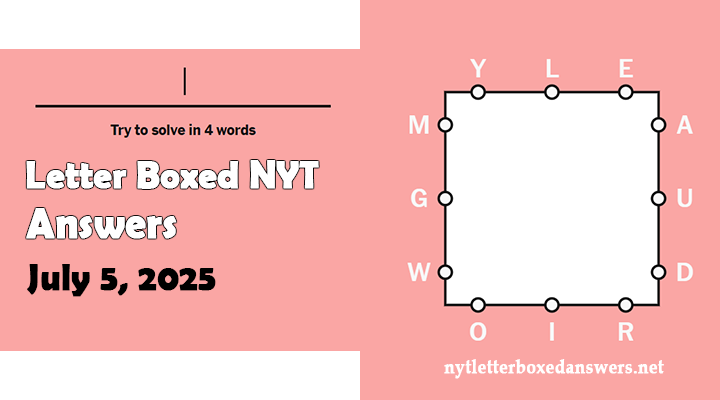NYT Letter Boxed quiz for Saturday July 5, 2025 is released. We came up with Letter Boxed July 5 2025 Answers and Hints for you. With the help of these hints, you will be able to guess the words of letter boxed quiz without revealing the answers and get the solution.
| Top | Right | Bottom | Left |
|---|---|---|---|
| YLE | AUD | OIR | MGW |
| Two Words Solution | ||
|---|---|---|
| ARGUER | RAILWAYDOM | |
| DIALOGUER | RAILWAYDOM | |
| GLOMERULAR | RAILWAYDOM | |
| GLOWED | DIAGRYDIUM | |
| Three Words Solution | ||
|---|---|---|
| AGLOW | WERGILD | DEMAGOGUERY |
| AGLOW | WIDOWED | DEMAGOGUER |

Word 01:
This 6-letter word starts with A and ends with R; a person who disputes or debates a topic.
Often engaged in formal or informal disagreements.
Can be a participant in courtroom or academic settings.
May represent differing viewpoints passionately.
Comes from the verb “argue.”
Could refer to someone playing devil’s advocate.
May be described as contentious or persuasive.
Found in legal, political, or philosophical contexts.
Associated with rhetoric and critical thinking.
Sometimes viewed as combative or logical.
Word 02:
This 10-letter word starts with R and ends with M; a coined or poetic term suggesting the realm of railways.
May refer to the railway industry as a whole.
Evokes imagery of locomotives and steel tracks.
Could imply authority or culture around trains.
Similar to words like “kingdom” or “freedom” in form.
Not a standard dictionary term.
May be used creatively in prose or headlines.
Refers to all things governed by rail transport.
Suggests an organized or mechanized system.
Potentially metaphorical for transit control.
Word 01:
This 9-letter word starts with D and ends with R; someone who takes part in a conversation or written dialogue.
Can be a character in plays or novels.
Might engage in peace talks or negotiations.
Rooted in the word “dialogue.”
Used in literary or political discussions.
Often signifies mutual communication.
May write or speak in a scripted format.
Involved in resolving conflict through words.
Can also be a playwright or screenwriter.
Rarely used outside formal or literary writing.
Word 02:
This 10-letter word starts with R and ends with M; a coined or poetic term suggesting the realm of railways.
May refer to the railway industry as a whole.
Evokes imagery of locomotives and steel tracks.
Could imply authority or culture around trains.
Similar to words like “kingdom” or “freedom” in form.
Not a standard dictionary term.
May be used creatively in prose or headlines.
Refers to all things governed by rail transport.
Suggests an organized or mechanized system.
Potentially metaphorical for transit control.
Word 01:
This 10-letter word starts with G and ends with R; relates to tiny filtering structures in the kidneys.
Derived from “glomerulus,” part of the nephron.
Critical in blood filtration and urine formation.
Found in medical and anatomical texts.
Part of renal and urinary system studies.
Subject of kidney disease diagnoses.
Can appear in terms like “glomerular damage.”
Filters waste while retaining vital substances.
Associated with blood pressure and protein levels.
Central to renal function and health monitoring.
Word 02:
This 10-letter word starts with R and ends with M; a coined or poetic term suggesting the realm of railways.
May refer to the railway industry as a whole.
Evokes imagery of locomotives and steel tracks.
Could imply authority or culture around trains.
Similar to words like “kingdom” or “freedom” in form.
Not a standard dictionary term.
May be used creatively in prose or headlines.
Refers to all things governed by rail transport.
Suggests an organized or mechanized system.
Potentially metaphorical for transit control.
Word 01:
This 6-letter word starts with G and ends with D; past tense of “glow,” meaning emitted light or radiance.
Often used to describe soft or warm brightness.
Can refer to skin, objects, or emotions.
May be literal (light) or metaphorical (pride).
Common in poetic or romantic language.
Associated with warmth or satisfaction.
Describes subtle illumination in darkness.
Often used in contrast to flicker or blaze.
Seen in phrases like “glowed with joy.”
May relate to nuclear, chemical, or thermal light.
Word 02:
This 10-letter word starts with D and ends with M; appears to be invented or very obscure, possibly sci-fi or fantasy.
Structure suggests pseudo-Latin or alchemical roots.
Could imply a compound or energy source.
Might appear in speculative or fictional writing.
Uncommon or nonexistent in formal science.
“Dia-” prefix suggests dual or cross; “-ium” implies element.
Possibly a magical metal or technology component.
Suitable for naming in futuristic settings.
Not found in standard dictionaries or databases.
Would likely require invented lore or backstory.
Word 01:
This 5-letter word starts with A and ends with W; means brightly lit or radiating warmth.
Often describes faces or rooms with warm light.
Used to express happiness or satisfaction visually.
Related to soft or internal illumination.
Seen in poetry, love scenes, or festive writing.
May be metaphorical for excitement or pride.
Derived from “glow” with prefix “a-”.
Common in holiday or romantic description.
Describes a visual warmth or inner emotion.
Antonym of dim or shadowed.
Word 02:
This 7-letter word starts with W and ends with D; an old term for compensation paid to settle a killing.
Used in Germanic and Anglo-Saxon law.
Amount depended on the status of the deceased.
Means “man price” in Old English.
Averted blood feuds through payment.
Appears in legal history and Beowulf.
Concept tied to justice and tribal honor.
Rarely used outside historical contexts.
Studied in medieval legal systems.
Calculated in silver or livestock historically.
Word 03:
This 11-letter word starts with D and ends with Y; political strategy that appeals to emotions, not reason.
Common in authoritarian or populist regimes.
Focuses on fear, prejudice, or anger.
Often used to manipulate masses.
Associated with charismatic, deceptive leaders.
Antonym of thoughtful or rational debate.
Found in political science and journalism.
Derives from Greek “dēmos” (people) + “agōgos” (leader).
Condemned in democratic discourse.
Leads to division, not solution.
Word 01:
This 5-letter word starts with A and ends with W; means brightly lit or radiating warmth.
Often describes faces or rooms with warm light.
Used to express happiness or satisfaction visually.
Related to soft or internal illumination.
Seen in poetry, love scenes, or festive writing.
May be metaphorical for excitement or pride.
Derived from “glow” with prefix “a-”.
Common in holiday or romantic description.
Describes a visual warmth or inner emotion.
Antonym of dim or shadowed.
Word 02:
This 7-letter word starts with W and ends with D; describes someone who has lost a spouse by death.
Common in both legal and emotional contexts.
May affect men or women (widow/widower).
Impacts marital status and inheritance rights.
Often involves grief and adjustment.
Can appear in biographies or obituaries.
May relate to pension or survivor benefits.
Derives from Old English “widewe.”
Can lead to changes in social roles.
Also used as a past participle verb (“He was widowed”).
Word 03:
This 11-letter word starts with D and ends with Y; political strategy that appeals to emotions, not reason.
Common in authoritarian or populist regimes.
Focuses on fear, prejudice, or anger.
Often used to manipulate masses.
Associated with charismatic, deceptive leaders.
Antonym of thoughtful or rational debate.
Found in political science and journalism.
Derives from Greek “dēmos” (people) + “agōgos” (leader).
Condemned in democratic discourse.
Leads to division, not solution.

Chris Brown is a passionate word game love and problem solving expert. With over 15 years of experience in solving puzzle challenges, he provides daily NYT Letter Boxed answers, tips and strategies to help other players so that they can improve their solving skills. Whether you are stuck on a tricky puzzle or looking for new techniques, Chris is here to guide you with his expert solutions.